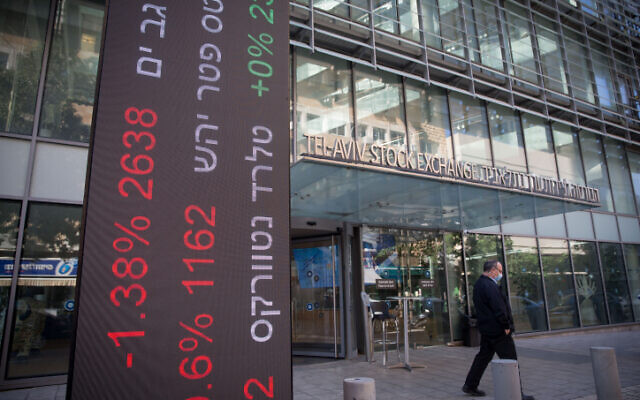Shekel weakens as Netanyahu puts judicial reform back on the agenda
Local currency returns to losses amid renewed uncertainty over the advancement of proposed changes to the judicial system
Sharon Wrobel is a tech reporter for The Times of Israel.
The shekel depreciated and Israeli shares were switching between losses and gains after Prime Minister Benjamin Netanyahu declared that his coalition government would press ahead with parts of its controversial plan to overhaul the judicial system.
The shekel weakened as much as 1.6% on Monday morning to around 3.61 against the US dollar and was trading at 3.60 at 12:19 p.m. The local currency strengthened more than 2% last week.
The Tel Aviv Stock Exchange’s benchmark TA-125 index slipped 0.1% and the TA-35 index of blue-chip companies was little changed in Tel Aviv. The TA index of the five largest banks was down 0.4% and the TA-Finance fell 0.6%. On Sunday, Israeli shares closed down more than 1%.
Netanyahu announced Sunday, when there is no trading in the local currency, that his government would commence to unilaterally advance elements of its judicial overhaul plan, days after the opposition said it was withdrawing from negotiations. At the same time, Netanyahu is said to have told ministers over the weekend that the coalition’s original legislation aimed at securing control over the Judicial Selection Committee will not be revived.
“We are seeing volatility around trading in the exchange rate mainly influenced by comments from government officials and reports around the plans for the judicial overhaul,” Sabina Levy, head of research at Leader Capital Markets, told The Times of Israel.
The shekel has gained more than 3% this month amid cautious optimism that a compromise on the judicial overhaul could be reached between opposition and coalition leaders and as an opposition representative was elected to a key judicial selection panel last week. Much of the optimism was crushed after opposition leaders announced last week that they would not continue negotiations to reach a consensus on judicial reforms at the President’s Residence.

In March, after a piece of legislation key to the judicial overhaul was advanced rapidly through the Knesset, Netanyahu announced a pause on the bills in order to allow for negotiations brokered by President Isaac Herzog aimed at reaching a broad agreement.
Since the plans for the judicial changes were announced at the start of the year, the local currency is down more than 2% as uncertainty over the course of direction of the overhaul affects investor sentiment.
Last week, the International Monetary Fund praised Israel’s “remarkable economic performance” in 2022, but warned that “uncertainty” over controversial judicial reforms may harm growth and have a “negative impact” on the economy. The fund called lawmakers to advance a “politically sustainable solution.”
“As in any country, maintaining the strength of the rule of law would be important for economic success,” the IMF said.
Times of Israel staff contributed to this report.










